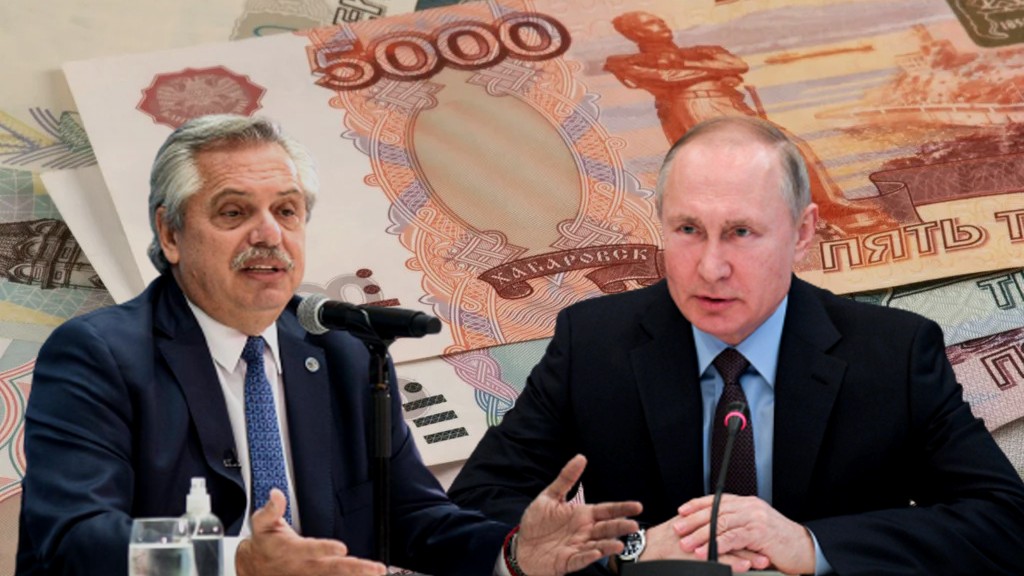RIO DE JANEIRO, BRAZIL – In an unusual diplomatic strategy, Argentina and Russia are sounding out the possibility of abandoning the dollar as the currency of exchange in transactions and redefining their trade balance to impose the exchange between rubles and Argentine pesos.
Read also: Check out our coverage on Argentina
The issue was discussed at the lunch that Alberto Fernández shared last week with a delegation of businesspeople from the Russian Direct Investment Fund (RDIF, Russia’s sovereign investment fund), Sovcombank executives, Russian diplomats, and a large part of the Argentine government.
According to what El Cronista has learned from high-ranking sources in the Casa Rosada, the Argentine ambassador in Moscow, Eduardo Zuain, has discussed the issue with Kremlin authorities, business people, and Russian diplomats. Russia’s idea is to displace the dollar and impose the Argentine Ruble-Peso exchange on paying commercial transactions.

The officials consulted admitted that this is not a simple equation and it is a very technical issue that requires financial engineering. The case must be analyzed by the head of the Argentine Central Bank, Miguel Pesce, who is already aware of the matter. However, the government admits that Moscow’s idea is being discussed and assures that this would be an extreme geopolitical challenge for Vladimir Putin.
If the Ruble-Peso transaction materializes, the dependence on the dollar would be set aside at a time when the inflationary spiral is wreaking havoc in the United States. At the same time, the Kremlin would also avoid avoiding any future sanctions.
It so happens that since 2014 the European Union and the United States have imposed economic sanctions on Russia targeting its energy, banking, and defense sectors. Now tougher sanctions are being considered if Moscow tries to invade Ukraine after increasing its troops on the border.
President Alberto Fernandez and Ambassador Zuain met alone for 38 minutes at the Casa Rosada. They talked about the visit of the Russian businessmen, the eventual visit to Moscow that the Head of State would make in April 2022, and the decision to boost bilateral trade.
For Putin, developing trade exchange in rubles with his allied countries would be a substantial challenge since it would not depend on the dollar in trade relations with other countries.
Although not as deep as in Argentina’s exchange rate scheme, a similar process is currently taking place in Moscow. The Ruble is depreciated in Russia with respect to the dollar. For each dollar, 74 Rubles are paid. Hence Putin’s need to reduce dependence on the U.S. currency.
Bilateral trade with Argentina is low: less than 900 million dollars a year, of which 600 million dollars go to Argentina and the rest to Russia.
However, Putin and the Russian Investment Fund intend to increase this trade flow and strengthen the strategic alliance that Cristina Kirchner and Putin sealed in 2010.
INVESTMENT AND TRADE
The mission of representatives of the leading Russian companies that visited Buenos Aires last week talked about boosting Russian investments in Argentina in mining, the expansion of train sales to Argentina, the solar panel industry, chemical products, and the oil industry. At the same time, Argentina would increase its potential for agricultural exports to Russia.
The possibility of Sovcombank setting up a headquarters in Buenos Aires and the eventual sale of Russian military equipment to the Ministry of Defense were also mentioned. If Moscow’s idea succeeds, all this could be carried out with a Ruble-Peso exchange.
Kirill Dmitriev, executive director of the Russian Direct Investment Fund, said that “the Russian trade mission in Argentina aimed to boost commercial ties and develop projects of great interest for our countries”.
The vaccine policy with the sale of Sputnik V during the pandemic increased trust between Putin’s administration and Fernandez. But for Dmitriev, “our common task is to look beyond the pandemic, strengthening trade and investment in existing and promising areas”.
The Russians also raised some doubts and concerns during the businessmen’s visit. For example, they asked different government officials about how to set up companies in Argentina, the tax facilities granted by the provinces, and, of course, the results of the negotiations with the IMF to pay the debt.

